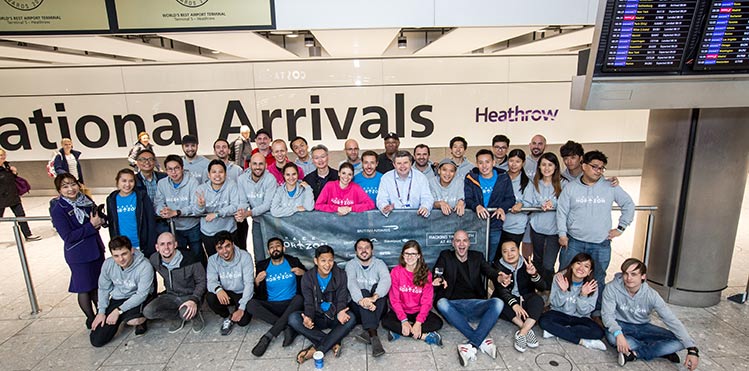Kristy Hart, co-founder, Hack Horizon, interviewed by Ross Falconer.

Kristy Hart, co-founder, Hack Horizon: “A lot of innovation labs and digital transformation teams at the moment are much like satellites, working way outside the organisation. Instead, we need to make them the core of the decision-making of the company.”
As the air transport industry embraces the fact that it must disrupt or be disrupted, hackathons have become a popular way to develop pioneering solutions in a short timeframe.
This summer, Hack Horizon, together with partners including Heathrow Airport, Hong Kong International Airport (HKIA) and British Airways, took this idea to the extreme with a 72-hour travel tech hackathon, in which 32 participants (who were whittled down from 671 applicants) developed and delivered eight prototypes while travelling 9,500km between Hong Kong and London.

Hack Horizon, together with partners including Heathrow Airport, Hong Kong International Airport and British Airways, undertook a 72-hour travel tech hackathon, in which 32 participants developed eight prototypes while travelling 9,500km between Hong Kong and London.
The eight teams lived and breathed the end-to-end air travel experience during the three days, while developing products with the aim of making the travel process more simple, seamless and enjoyable.
The event was the brainchild of Kristy Hart, Johannes Jaeger, Kosta Kolev and Sandra Sobańska, co-founders of Hack Horizon. “We’re millennials, so we have a love of travel and a passion for technology,” explains Hart. “We wanted to act as a catalyst to shake-up the travel industry, break down the barriers for travel tech start-ups, and expose the power of cross-industry collaboration.”
The BA-operated Hong Kong-Heathrow route made sense as the two airports last year signed a collaborative partnership to share expertise and experience, while British Airways is, of course, the biggest airline customer at Heathrow. The hackathon also had the support of a number of other big-name travel technology companies, including Travelport, Skyscanner and SITA.
The eight teams built a diverse range of prototypes designed to solve the various pain points throughout the travel experience. Ideas ranged from an end-to-end security luggage transfer service powered by blockchain and a smartwatch that leverages deep learning to personalise the passenger experience at airports, to a chatbot that enables groups to collaborate on trips and bookings. The winner was ‘Destination’, an inflight entertainment to mobile retail solution, allowing passengers to book activities at their destination while onboard.
“Creating cool tech for the sake of cool tech carries a danger that what you’re developing won’t necessarily be good for the business or the customer you’re trying to serve. So focusing on a specific problem, and being aware of customers’ needs, should be at the heart of the solution,” says Hart.
While speaking of her support of Heathrow and HKIA’s recent partnership aimed at exchanging knowledge and driving forward their digital information, she also highlights airports such as Singapore Changi as benchmarks of customer innovation.
“Airports need to focus on how innovation labs can fit into the company. A lot of innovation labs and digital transformation teams at the moment are much like satellites, working way outside the organisation. Instead, we need to make them the core of the decision-making of the company. The idea of a lab should not be to act as an external test bed for ideas that you might then integrate into your core business, but to build them as a core part of the organisation itself,” Hart concludes.







